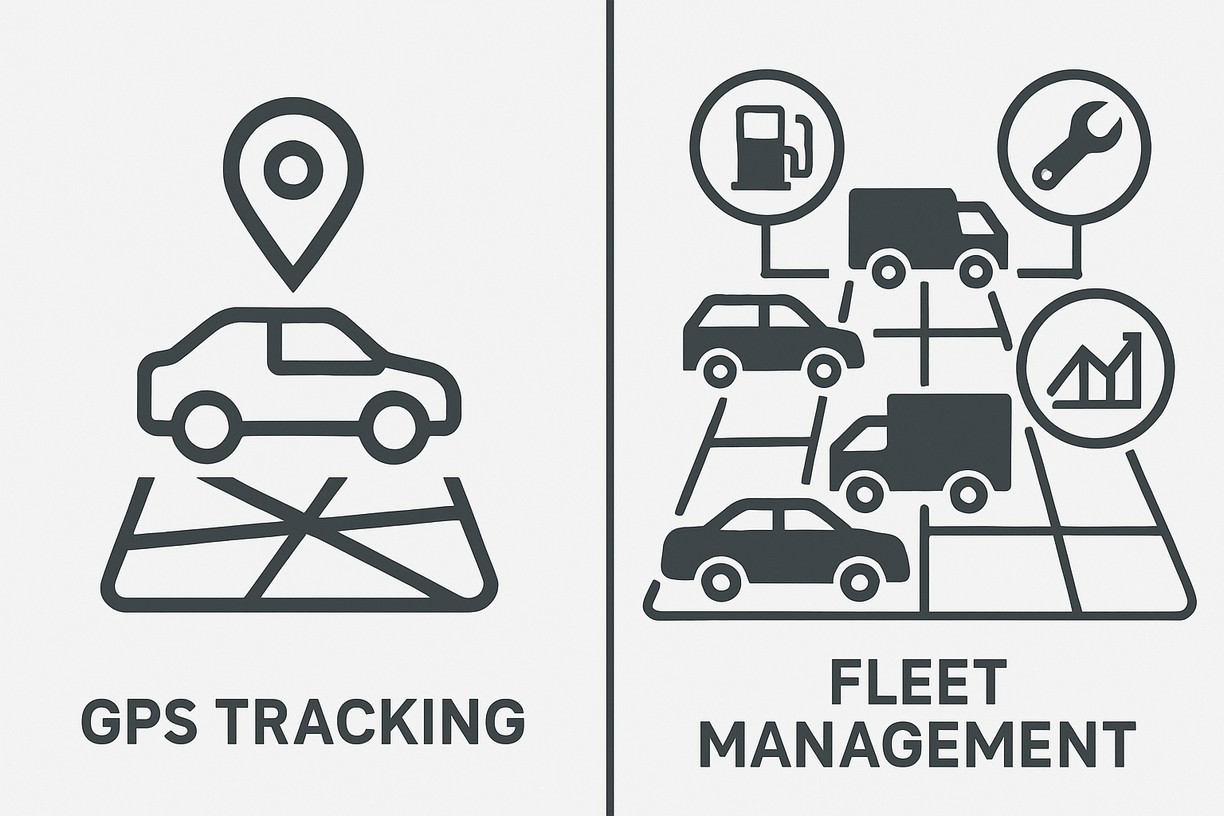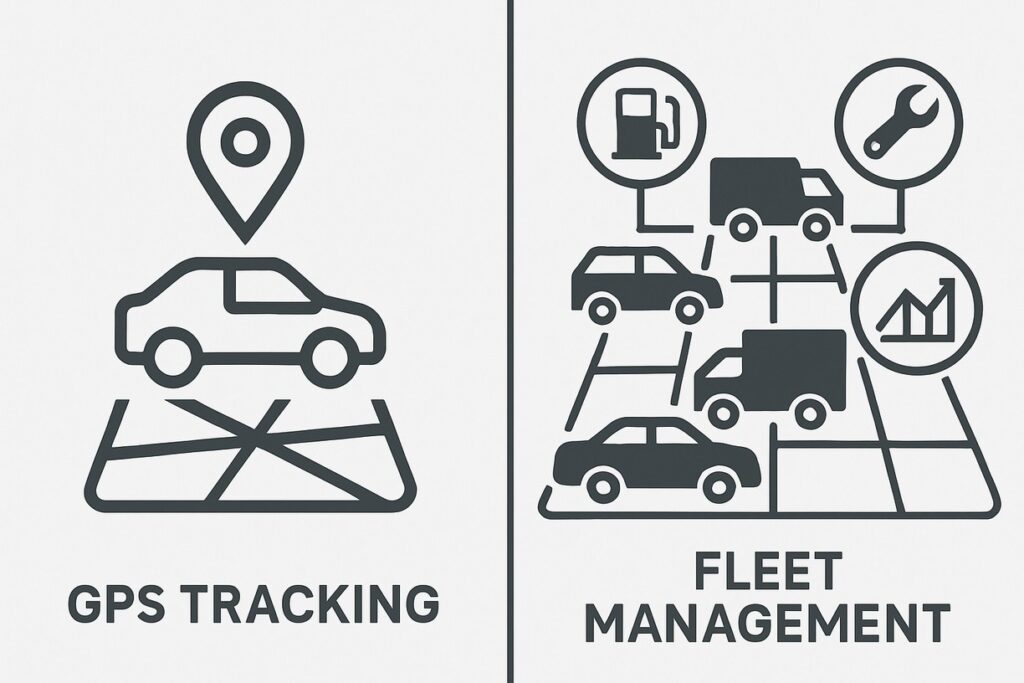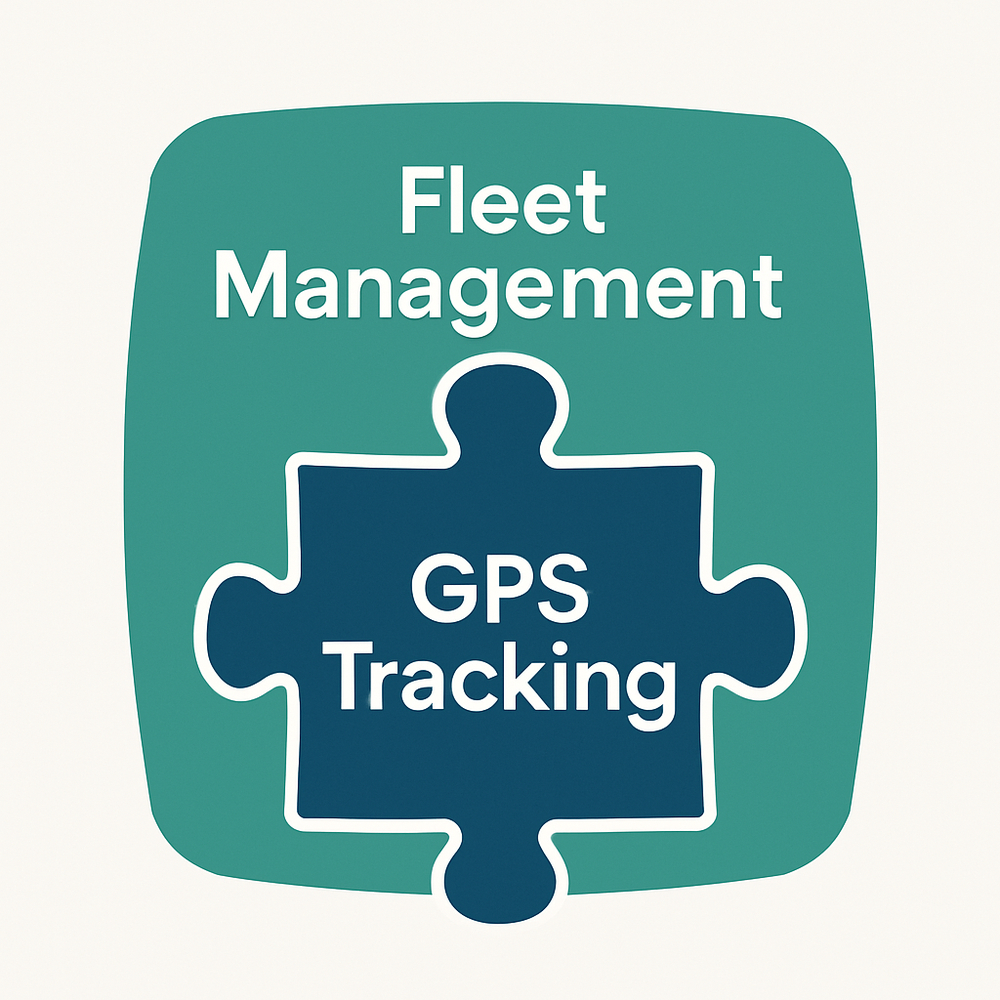

Ever wondered how businesses keep tabs on their vehicles or optimize their entire fleet? Whether you’re a small business owner tracking a single delivery van or managing a fleet of trucks across the country, technology like GPS tracking and fleet management systems can be a game-changer. But here’s the catch: they’re not the same thing. While both help you stay in control, they serve different purposes. So, what’s the difference between a GPS tracking system and a fleet management system? In this article, the expert team of Kommnet technologies will break it down in a way that’s easy to grasp, like comparing a bicycle to a full-on motorcycle.
What is a GPS Tracking System?
Definition and Core Functionality
A GPS tracking system is like a trusty compass for the digital age. It uses Global Positioning System (GPS) technology to pinpoint the exact location of a vehicle, asset, or even a person in real time. Think of it as a tool that answers one big question: “Where is it?” Whether it’s your delivery truck or a piece of expensive equipment, GPS tracking keeps you in the loop.
How GPS Tracking Works
Picture this: satellites orbiting Earth are constantly chatting with a GPS device installed in your vehicle. These devices pick up signals from at least four satellites to calculate precise coordinates. That data is then sent to a platform (usually a mobile app or website) where you can see the location on a map. It’s like having a bird’s-eye view of your assets, updated every few seconds.
Common Uses of GPS Tracking
GPS tracking is a jack-of-all-trades. Small businesses use it to monitor delivery vans, parents track their teen’s car, and logistics companies keep an eye on shipments. It’s also a lifesaver for recovering stolen vehicles or equipment. If location is your main concern, GPS tracking is your go-to.
What is a Fleet Management System?
Definition and Scope
Now, let’s shift gears. A fleet management system is like the brain of your entire operation. It’s a comprehensive software solution that goes way beyond just tracking locations. It helps businesses manage every aspect of their vehicle fleet. think maintenance schedules, driver performance, fuel usage, and more. It’s the difference between knowing where your car is and knowing how efficiently it’s being driven.
Key Components of Fleet Management
Fleet management systems are packed with features. They include GPS tracking (yes, it’s part of the package!), but they also monitor things like:
- Vehicle health: When’s the next oil change?
- Driver behavior: Are drivers speeding or braking too hard?
- Route optimization: What’s the fastest way to deliver goods?
- Analytics: How can you cut costs or improve efficiency?
It’s like having a personal assistant for your fleet, keeping everything running smoothly.
Industries That Rely on Fleet Management
From trucking companies to food delivery services, fleet management is a must for industries with multiple vehicles. Construction firms use it to manage heavy machinery, while public transit agencies rely on it to keep buses on schedule. If your business depends on a fleet, this system is your MVP.
Key Differences Between GPS Tracking and Fleet Management
Scope and Functionality
Here’s where the rubber meets the road. GPS tracking is laser-focused on location. It’s a single-purpose tool that tells you where something is, period. Fleet management, on the other hand, is like a Swiss Army knife. It includes GPS tracking but adds layers of functionality, like managing drivers, optimizing routes, and tracking expenses. If GPS tracking is a flashlight, fleet management is a whole toolbox.
Data and Insights
GPS tracking gives you raw location data – coordinates, speed, and maybe a travel history. Fleet management systems take that data and turn it into actionable insights. For example, they might flag a driver who’s idling too long or suggest a route that saves fuel. It’s the difference between knowing your truck is in Chicago and understanding why it’s burning through gas faster than it should.
Cost and Complexity
GPS tracking systems are usually cheaper and easier to set up. You can buy a plug-and-play device for under $100 and pay a small monthly fee for the software. Fleet management systems? They’re pricier and more complex, often requiring professional installation and training. But for larger businesses, the investment pays off in efficiency and savings.
Benefits of GPS Tracking Systems
Real-Time Location Monitoring
Ever lost track of a delivery? With GPS tracking, you’ll know exactly where your vehicle is at any moment. This is a huge win for security. Stolen vehicles can be recovered faster, and you can ensure drivers stick to their routes. It’s like having a virtual leash on your assets.
Cost-Effectiveness for Small Businesses
For small businesses or solo entrepreneurs, GPS tracking is a budget-friendly option. You don’t need a fancy system to keep tabs on one or two vehicles. Plus, the peace of mind from knowing your assets are safe? Priceless.
Benefits of Fleet Management Systems
Improved Operational Efficiency
Fleet management systems are like a GPS for your entire business. They optimize routes to save time and fuel, schedule maintenance to prevent breakdowns, and even reduce paperwork. The result? A leaner, meaner operation that gets more done with less effort.
Enhanced Driver Safety and Compliance
Nobody wants a reckless driver on their team. Fleet management systems monitor behaviors like speeding or harsh braking, helping you coach drivers to be safer. They also ensure compliance with regulations, like hours-of-service rules for truckers. It’s like having a copilot who keeps everyone in line.
Which System is Right for Your Business?
Assessing Business Needs
Choosing between GPS tracking and fleet management comes down to your needs. Ask yourself:
- Do you just need to know where your vehicles are?
- Are you managing multiple vehicles and drivers?
- Do you want to cut costs or improve efficiency?
If location is your only concern, a GPS tracking system is enough. But if you’re juggling a fleet, a fleet management system is worth the investment.
Scalability and Future Growth
Think about where your business is headed. A GPS tracking system might work now, but what if you add more vehicles? Fleet management systems are built to scale, making them ideal for growing businesses. It’s like choosing between a scooter and a car. You might need the car as your journey gets bigger.
Can GPS Tracking and Fleet Management Work Together?

Here’s the good news: you don’t always have to choose. GPS tracking is often a core feature of fleet management systems. Think of GPS as the foundation and fleet management as the house built on top. Many businesses start with GPS tracking and later upgrade to a full fleet management system as their needs grow. It’s like adding rooms to your house without tearing down the walls.
Future Trends in GPS and Fleet Management
The world of tracking and fleet management is evolving fast. Artificial intelligence (AI) is making systems smarter, predicting maintenance needs before breakdowns happen. The Internet of Things (IoT) is connecting vehicles to everything from traffic lights to weather reports. And predictive analytics? It’s helping businesses forecast demand and optimize routes like never before. The future is bright, and these systems are becoming more like co-pilots than tools.
Conclusion
So, what’s the difference between a GPS tracking system and a fleet management system? It’s simple: GPS tracking tells you where your vehicles are, while fleet management helps you run your entire operation like a well-oiled machine. If you’re a small business or just need basic location data, GPS tracking is your best bet. But if you’re managing a fleet and want to boost efficiency, safety, and savings, a fleet management system is the way to go. Either way, both systems are powerful tools to keep your business moving forward. Ready to take control of your vehicles? The choice is yours.
FAQs
1. Can a GPS tracking system replace a fleet management system?
Not really. GPS tracking is great for location data, but it lacks the advanced features of a fleet management system, like route optimization or driver monitoring. If you need more than just location, fleet management is the better choice.
2. Are fleet management systems expensive?
They can be pricier than GPS tracking systems, with costs depending on the number of vehicles and features. However, the savings from improved efficiency often outweigh the initial investment.
3. Do I need technical skills to use these systems?
Most GPS tracking and fleet management systems are user-friendly, with intuitive apps and dashboards. Some fleet management systems may require training, but providers often offer support.
4. Can I use GPS tracking for personal vehicles?
Absolutely! GPS tracking is perfect for personal use, like monitoring a teen driver or protecting your car from theft. Fleet management systems are overkill for personal vehicles.
5. How do I know if my business needs a fleet management system?
If you manage multiple vehicles, deal with complex logistics, or want to cut costs, a fleet management system is likely a good fit. Start by assessing your business goals and growth plans.
